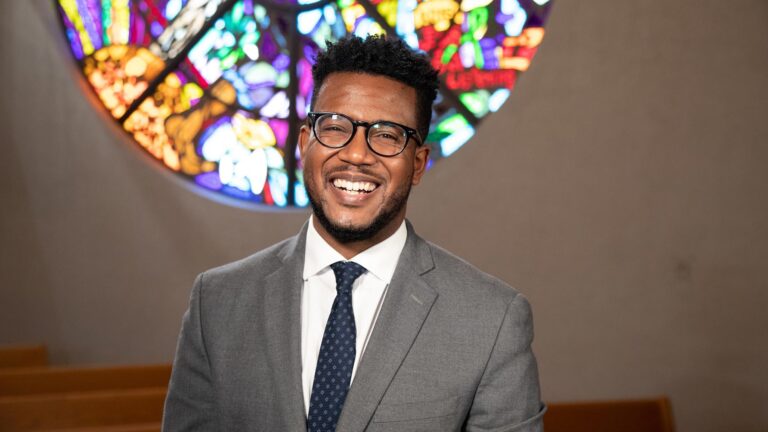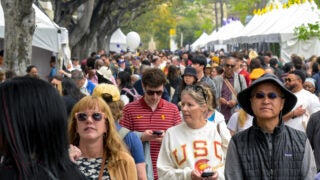
New associate dean of religious life brings varied ministry experience to USC
The Rev. Brandon Harris is eager to help USC students find connection, meaning and belonging. He starts in his new role on Monday.
The Rev. Brandon Harris understands how important the college years can be in determining one’s life path, both professionally and personally.
Harris entered his first undergraduate year intent on becoming a doctor or a lawyer and left on a path of faith. He credits a large part of that transition to the mentors he had during his time at university.
As he begins his latest journey on Monday as associate dean for USC’s Office of Religious and Spiritual Life, Harris, 30, hopes he can provide the same level of support and direction his mentors gave him when he was a student.
“It’s one of those unique phases of life in which you have the opportunity to really think about the big questions,” Harris said. “Being able to support students as they think about what they want to do in life, and what gifts, skills and opportunities they can bring to the world, is a lot of fun and truly a joy.”
Lessons from an iconic house of worship for new USC associate dean of religious life
A graduate of Lincoln University in Pennsylvania — one of the oldest historically Black colleges in the United States — Harris went on to earn his master of divinity from Emory University in Atlanta. There, he interned at Ebenezer Baptist Church, where Martin Luther King Jr. was once a pastor. Since 2005 the church has been led by current U.S. Sen. Raphael Warnock, who influenced Harris during his internship at Ebenezer from 2014 to 2016. There, Harris led different worship services and Bible studies with students in elementary school all the way up through college.
He is a thoughtful, dedicated and deeply committed servant leader.
U.S. Sen. Raphael Warnock
“I am excited for this next chapter in the Rev. Brandon Harris’ career,” Warnock said. “He is a thoughtful, dedicated and deeply committed servant leader. I have witnessed his character, leadership and heart for God and have no doubt that the University of Southern California will benefit from his appointment as the associate dean for the Office of Religious and Spiritual Life.”
Harris began to work with college students during his time at Ebenezer, where he founded a weekly Bible study at Georgia State University.
“That’s where I really learned what it meant to be a pastor — that being a pastor meant showing up for people, whether that was at funerals, hospital bedsides or simply working with college students,” Harris said.
Leading a congregation and path to ministry
Following his graduation from Emory in 2016, Harris moved to Washington, D.C., where he has served in both academia and ministry for nearly six years. Starting as a Protestant chaplain at Georgetown University, he eventually became an adjunct lecturer, teaching courses in spirituality and leadership, African American religious and intellectual history, and 20th-century Protestant theology.
Though he continued as a lecturer at Georgetown, he eventually left his position as a chaplain to become the senior minister of Peoples Congregational United Church of Christ.
Harris, originally from upstate New York, said that ministry was not always in the cards. After arriving at Lincoln University and taking an introductory course on religion, he developed an interest in the subject and switched his major — at the encouragement of several faculty members — to religion and political science.
I just wanted to see how religion could play a role in thinking about matters of justice and human flourishing in the world.
The Rev. Brandon Harris
“I had an interest in politics, a commitment to social justice, and I just wanted to see how religion could play a role in thinking about matters of justice and human flourishing in the world,” he said.
During his time at Lincoln, Harris interned as a pastor at a rural and predominantly white congregation. Though it wasn’t his first exposure to public speaking, it was the first time he led a congregation of people with such different life experiences than he had. Harris credits those early days with helping to show him how unifying religion can be and affirming that ministry was something that he would do with his life.
He ultimately decided to go to Emory for a master of divinity and certificates in Black church studies and Baptist studies, though he had never been to the South.
“I connected with students because of our shared experience of being new to Atlanta, and the fact that many of them were first-generation college students,” he said. “Our work as ministers and college chaplains is to connect with people and with their stories.”
Becoming a Trojan
Varun Soni, USC dean of religious life, said that Harris is one of the most accomplished and inspiring religious leaders that he knows.
Through his pastoral care he builds communities of belonging and justice wherever he goes, and I’m so excited that he’s now joining our campus community.
Varun Soni, USC dean of religious life
“As a chaplain and professor at Georgetown University, and as the senior minister of the Peoples Congregational United Church in Washington, D.C., he has walked alongside students during their most triumphant and traumatic moments, offering spiritual counseling, theological reflection and love,” Soni said. “Through his pastoral care he builds communities of belonging and justice wherever he goes, and I’m so excited that he’s now joining our campus community.”
With many students identifying as nonreligious, Harris said he sees a large part of his role on campus as simply listening.
“How do we help you find connection, meaning or belonging in the USC community?” Harris said. “How can our office help you to find those places where you feel supported and safe and connected?”
As he prepares for his new role in a new school and in a new part of the country, Harris said he’s looking forward to being part of a dedicated team that understands the true purpose of the office.
“The heartbeat of what we do is to make sure that students have a place where they can thrive and where they feel seen and where they feel supported,” Harris said. “That’s the main focus of what we’re called to do.”



